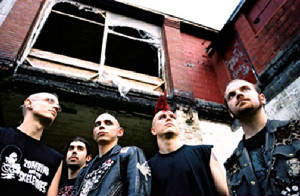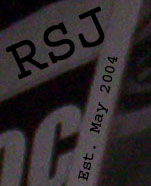 
Bella Morte's Andy Deane grew up listening to metal. That's right, while goth kids were worshipping at the alter of Bauhaus,
the man who would go on to front a band that has become one of the scene's staples was rocking out to Iron Maiden and Napalm
Death. But it's the band's varied influences that have actually played a major role in making Bella Morte memorable, propelling
them through a seven year long career. With their most recent work, As The Reasons Die, just released by Metropolis, Andy
talks to Rock Star Journalism about founding what might just be the only goth/punk/metal/deathrock band alive.
You've mentioned growing up listening to bands like Iron Maiden and Minor Threat. How did you move from that into a band
with a heavy synth element?
Well, actually, my favorite Iron Maiden album was an album called Seventh Son Of A Seventh Son, and it has a heavy dose
of synth in it as well. I just try not to be close-minded about music cause I also loved a lot of 80s new wave growing up,
all the way down to death metal like Obituary and Napalm Death. So, it wasn't actually that big a step, considering it was
just taking all my influences and throwing them into one pot.
Not a lot of bands can claim both a punk and a goth sound; how do you feel that these different influences work together?
I think goth music has certainly got a dark edge to it, and punk has just got that energy that I think some goth music
is lacking. I think when you put them together you can come up with something pretty good. I definitely don't like going to
a show when the band is low energy and just standing around. But at the same time, I wouldn't want to be limited by either
label; I'd rather just kinda do exactly what we want to do and hear what we want to hear at the end of writing a song.
I read that you studied opera for years; how do you think that influenced your vocal style?
Well, it gave me a lot of ability to jump around on stage without losing my voice. And a lot of control over tone and
everything like that. My teacher helped me so much; I studied for a little over five years, so it was definitely a huge influence
on what I could sing, the range I could sing in and everything else.
Your sound seems to evolve with each album; how would you describe the songs on As The Reasons Die?
I think it's still got a lot of elements that are key to making a Bella Morte album, but it has a lot cleaner production,
and I think our songwriting has matured a thousand times. And it's by far our biggest album, and I think it's the first one
that has a shot at some real commercial success. We're shooting our first video this July in L.A. while we're out on tour
to try to get some airplay on TV.
Would you say that the songs have become more hook-driven?
Not really. I think that's always been kind of a fun thing for us to write is the hooks in the songs. I think the production
might make the hooks a little more apparent, but I think a lot of our music's been pretty catchy all along. Having that punk
element in the band, you're gonna have a lot of verse-chorus-verse-chorus format to the songs. So, if you don't have a hook
in a song like that, or something in the chorus that's memorable, you really don't have much of a song.
Do you think that's a necessary element if you want to succeed in today's heavily dance oriented goth scene?
I don't, actually, because I think a lot of the powernoise music that's come out and dominated some of the dance floors
in the U.S. hasn't had hooks at all. So, no, I definitely don't think anything's necessary other than decent production --
I think that's mostly the key cause I would never want to change our sound just to fill a dance floor. But if getting better
production on that same song helps, then I definitely don't have a problem with it.
Speaking of the production, when you've talked about the evolution of your sound in the past, you've mentioned how having
access to better equipment has affected the work. There have been so many technological developments in recent years; what's
been the most important innovation for creating your music?
I think just getting off of keyboard-based sequencers and onto computer-based sequencers. And there are programs like
Reason that an amateur can pick up and be writing music in like a day, good quality music. You, of course, still have to have
the ideas in your head to write the songs, but it's so much more intuitive and so much easier than sitting there working on
a synthesizer.
You already have several dates scheduled for your new tour; are you planning any changes to your stage show?
Not at all. We're going to come out and pound away as we normally do. We always do really high energy shows. We're not
one of those bands that scripts out our shows; we have a basic setlist that we play off of, but the rest of it's up to chance
-- what happens, happens.
Why did you decide to finally get a live drummer?
It was once again the energy level. There's just so much you can do with a sequencer, and bringing Jordan [Marchini] in
on drums has taken the energy to a new level. And we actually have already recorded a cd that's gonna be hopefully coming
out later this year called Songs For The Dead, and it's our first cd that features completely live drums; there's not even
one sequenced part on the cd. It's kind of a follow-up to our Death Rock EP, so it focuses on our deathrock, punk and metal
stuff.
Do you prefer playing regular concert club shows or performing at the goth night at a particular club?
They're both fun in their own way. I love goth kids, and to some extent, their support got us where we are now. But, there's
also something really exciting about going to just the standard rock'n'roll club and to see that our music is definitely reaching
outside the scene and is reaching new audiences cause that's very important to me as well. Growing up on metal, it's pretty
exciting for me to see so many metalheads showing up at the shows, as well as punk kids and everything else.
You played GothCon in 2002; how was the experience of playing a convention specifically for the gothic community?
Oh, we had a really good time there. A lot of fun on stage, really good memories from that whole weekend. I just totally
remember Gopal, Bn and me and James, our old keyboardist, all just hanging out, running around the hotel having a good time.
But it was a lot of fun. And Voltaire was there, and we're really good friends with him.
Did you find a supportive scene, coming out of Charlottesville? Being from the Baltimore area, we've found that there's
not much of a goth scene around here.
You know, Charlottesville exploded with a goth scene. We played a couple of empty shows, and then one night we were playing
at Tokyo Rose, and we get up on stage and there were 150 kids there. It was amazing, all these people just kinda crawled out
of the woodwork. And then we started The Dawning; all these people had something to rally around, and it was like a big family.
And there were a whole lot of kids in the scene and not all of them necessarily goths. At The Dawning we tried to encourage
the indie rock kids, punks, metalheads, whatever, to come out and have a good time. I really like the mixing of crowds, and
you don't necessarily find that everywhere, but the night thrived for a long time.
How often do you get out to the local goth/industrial nights?
Anytime we're home. We just played a show here last week, but pretty much when we're home we can go out anytime we want.
This scene tends to categorize music very specifically -- EBM, synthpop, coldwave, etc. -- being in a band that crosses
genres, have you found that people try to pigeonhole you?
Yeah, but at the same time we just don't pay attention to it because I think that it's kind of one of those things where
the fans will make up their own minds. Take a band like The Misfits back in the day, all the punks called them punks, all
the deathrockers called them deathrock. It just depends on what you're into; people try to pull bands into their own little
section. And I don't care, I don't care if somebody calls us a goth band. We just played the UK and there were a couple reviews
that were saying we were a metal band.
As a long-standing part of the goth community, what do you think is the biggest misconception about the scene?
I don't know. I don't know that there are necessarily misconceptions. As far as people I care to talk to, I think people
realize that people are just gonna be people regardless of what they're dressed like and what they're into. What counts is
what's inside of somebody. And I live in a small town and I've got a bright red Mohawk, and nobody gives me any shit around
here at all. I mean, I've heard people that have had problems with people wanting to fight them and stuff, but it's such a
part of the mainstream at this point with the more mainstream acts like Marilyn Manson and Orgy breaking out, I just don't
see how it can really shock anyone at this point.
You've been involved with several side projects -- Nerve No Pain, Xerox -- are any of these currently active?
Neither are active right now, and I really doubt Xerox is gonna actually release anything just because of time constraints.
But Nerve No Pain is my metal band, and we will defiantly put out a cd in the future. It's something that is very close to
my heart and something that I definitely want to release some material from.
I read that you've also written some horror stories. Any interest in getting these published?
I definitely do. That's something that I want to get into later on. I've got tons and tons of ideas and quite a few of
them written out already. So, I'd love to put out an anthology of short stories to start and then later on move into horror
novels and things like that.
For more info: http://www.bellamorte.com
|

